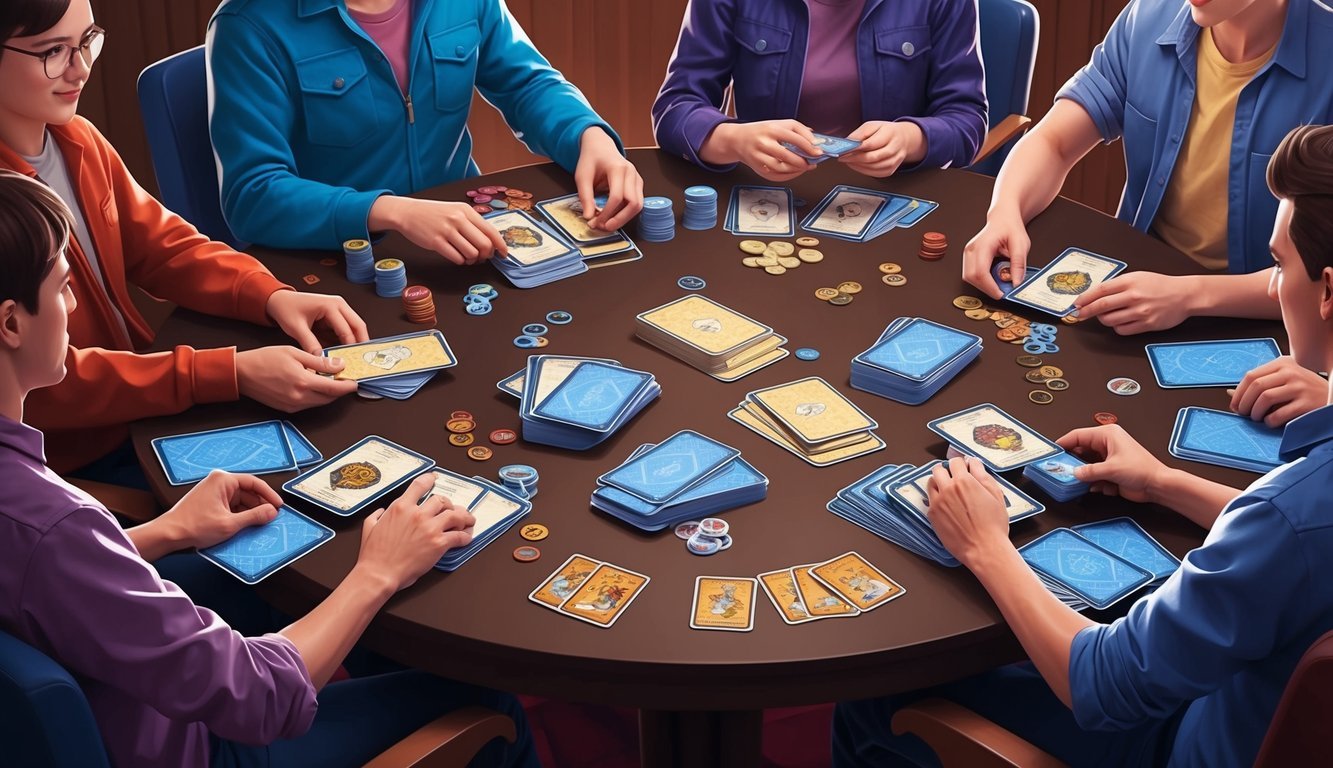Deck-building card games have taken the tabletop world by storm, offering a fresh twist on traditional card games.
Instead of bringing a pre-constructed deck to the table, you start with a small set of basic cards and gradually build your deck as you play.
These games combine strategic decision-making with the thrill of discovering powerful card combinations, creating a uniquely engaging experience.
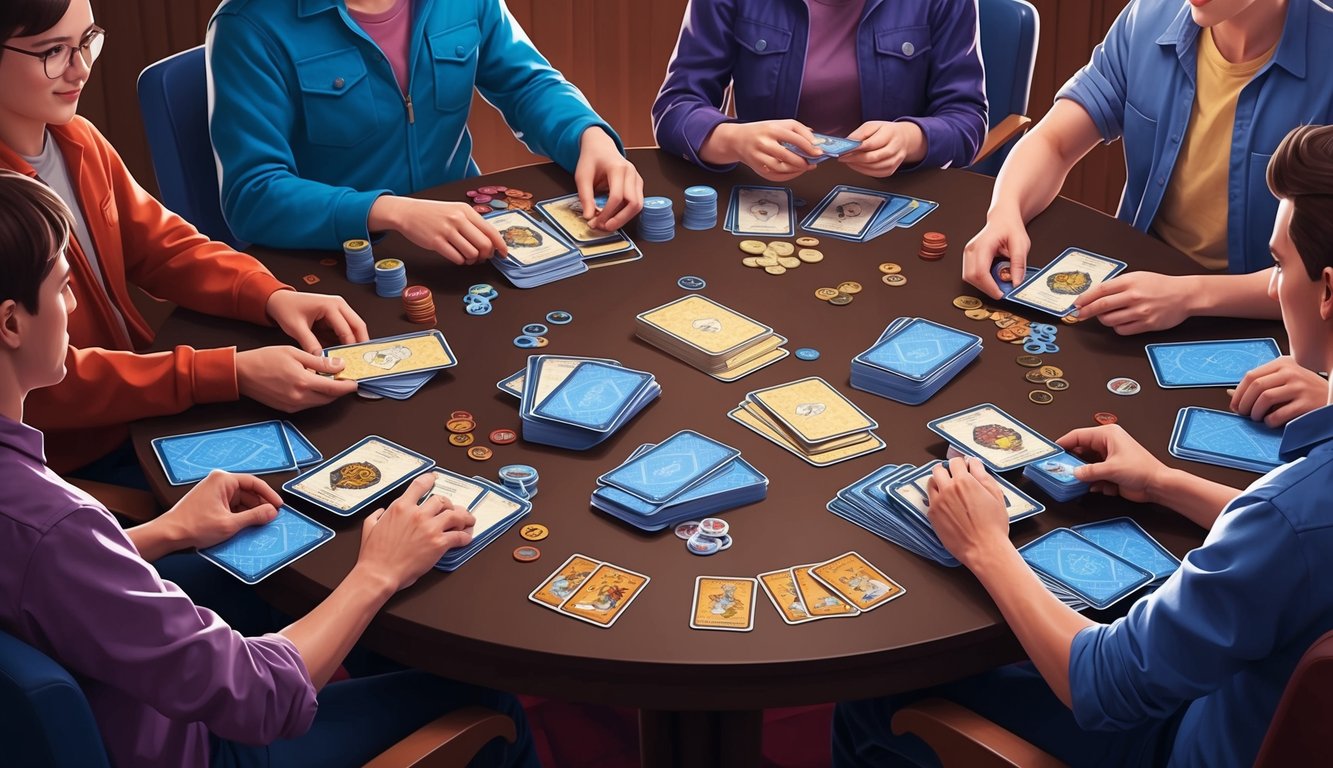
You’ll find a wide variety of deck-building games to suit your tastes.
From fantasy-themed adventures like “Dominion” to sci-fi epics like “Star Realms,” there’s something for everyone.
Digital versions have also gained popularity, with games like “Slay the Spire” offering the added convenience of automatic card management and complex calculations.
Whether you’re a seasoned card game enthusiast or new to the hobby, deck-building games offer an accessible yet deep gameplay experience.
You’ll enjoy the satisfaction of watching your deck grow stronger with each turn, adapting your strategy to outmaneuver opponents or overcome challenging scenarios.
Ready to dive into the world of deck-building? Let’s explore some of the best titles and what makes them so captivating.
Evolution of Deck-Building Games
Deck-building games have come a long way since their inception.
You’ve likely seen how they’ve transformed from simple card swapping to complex strategic experiences.
From Trading to Deck-Builders
Remember trading card games? They were the precursors to modern deck-builders.
You’d collect cards and build a deck before playing.
But the actual gameplay wasn’t about building your deck.
Dominion changed everything in 2008.
It introduced the concept of building your deck during the game.
You start with a basic set and acquire new cards as you play.
This mechanic quickly caught on.
Soon, digital versions appeared.
Games like Slay the Spire took advantage of computer processing to handle complex card interactions.
No more manual bookkeeping for you!
Influence of Magic: The Gathering
Magic: The Gathering paved the way for deck-builders.
It taught players the joy of crafting unique decks.
You’d spend hours fine-tuning your strategy before even playing a match.
Deck-builders took this concept and streamlined it.
Now you build your deck as part of the game itself.
It’s faster, more accessible, and just as strategic.
Many deck-builders borrow mechanics from Magic.
You’ll see familiar concepts like mana costs and creature summoning.
But they’ve adapted these ideas to fit their own unique gameplay styles.
Today, you can find deck-builders in various themes.
Want superheroes? Try Marvel Legendary.
Prefer sci-fi? Dune: Imperium might be your style.
The genre keeps evolving, offering you new ways to play and strategize.
Fundamentals of Deck-Building Mechanics
Deck-building games revolve around clever card management and strategic decision-making.
You’ll start with a basic deck and gradually enhance it through acquiring new cards and refining your strategy.
Game Engine and Player Interaction
In deck-building games, you begin with a small, predetermined set of cards.
As the game progresses, you’ll use these cards to gain resources, which you can then spend to acquire more powerful cards from a shared pool.
Your turn typically involves drawing a hand of cards from your deck, playing them for various effects, and then discarding them.
When your deck runs out, you shuffle your discard pile to form a new deck.
Player interaction varies between games.
Some focus on indirect competition, where you race to build the most efficient deck.
Others involve direct conflict, allowing you to attack opponents or hinder their strategies.
Card Play and Tactical Options
Each card in your deck offers unique abilities and tactical choices.
You’ll need to decide which cards to play, when to play them, and in what order to maximize their effectiveness.
Some cards provide resources, while others offer special actions or powerful effects.
You might encounter cards that let you draw more cards, attack opponents, or manipulate your deck.
As you build your deck, you’ll want to create synergies between cards.
Look for combinations that work well together and support your overall strategy.
Remember, a lean, focused deck is often more effective than a large, unfocused one.
Timing is crucial in deck-building games.
You’ll need to balance short-term gains with long-term strategies, deciding when to acquire new cards and when to focus on using what you already have.
Classic and Influential Titles
Deck-building games have evolved significantly since their inception, with several standout titles shaping the genre.
These games introduced innovative mechanics and themes that continue to influence modern designs.
Dominion and Its Impact
Dominion burst onto the scene in 2008, revolutionizing card gaming.
You start with a small deck of basic cards and gradually acquire more powerful ones to build your kingdom.
Its simple yet deep gameplay loop of buying cards and chaining actions became the foundation for countless deck-builders that followed.
Dominion’s expansions add variety without overcomplicating the core experience.
You can mix and match sets to create unique game setups, ensuring high replayability.
The game’s success sparked a boom in deck-building designs, cementing its place as a modern classic.
Aeon’s End and Ascension
Aeon’s End puts a cooperative spin on deck-building.
You and your friends defend a city against powerful monsters, each with unique abilities.
The game’s innovative turn order system keeps you on your toes, as you never know who’ll act next.
Ascension, another early entry in the genre, introduces a dynamic central row of cards.
You’ll compete to acquire powerful heroes and constructs while defeating monsters for victory points.
Its quick playtime and streamlined rules make it an excellent gateway into more complex deck-builders.
Star Realms merges deck-building with direct player conflict in a space-themed setting.
You’ll build up your fleet and bases to whittle down your opponent’s authority.
Its portability and addictive gameplay have made it a hit among casual and competitive players alike.
Popular Deck-Building Board Games
Deck-building board games offer exciting strategic gameplay where you construct your deck as you play.
Two standout series in this genre are Clank! and Star Realms, each bringing unique twists to the core mechanics.
Clank! Series and Expansions
Clank! puts you in the role of a thief sneaking into a dragon’s lair.
You’ll build your deck to move through the dungeon, grab treasure, and escape before the dragon catches you.
The game’s signature noise mechanic adds tension – make too much “clank” and you’ll wake the dragon!
Clank! In! Space! takes the concept to a sci-fi setting.
You’re now infiltrating an evil overlord’s spaceship.
It adds new elements like hacking and faction alliances.
Clank! Legacy lets you permanently alter the game over multiple plays.
Your decisions shape the story and unlock new cards and board areas.
Numerous expansions add variety to the base games.
New boards, characters, and card types keep the Clank! series fresh and exciting.
Star Realms and Its Unique Offerings
Star Realms pits you against an opponent in space combat.
You’ll build a fleet of ships and bases to attack your rival and defend yourself.
Its quick playtime and portable format make it great for on-the-go gaming.
The game shines in its faction synergies.
Focusing on specific factions like the Trade Federation or the Blob can lead to powerful card combinations.
Star Realms offers digital versions for PC and mobile, letting you play against AI or online opponents.
This makes it easy to get games in anytime.
Expansions like Colony Wars and Frontiers add new cards and gameplay modes.
You can even play cooperatively against boss enemies in some variants.
Deck-Building in the Digital Space
Digital platforms have revolutionized deck-building games, offering new ways to collect cards and battle opponents.
You can now build decks and play against others worldwide from your computer or mobile device.
Magic: The Gathering Arena
Magic: The Gathering Arena brings the iconic card game to your screen.
You’ll find thousands of cards to collect and build decks with, mirroring the physical game’s vast options.
The digital format makes it easy to manage your collection and experiment with different strategies.
You can quickly swap cards in and out, testing new combinations without the hassle of physical sorting.
Arena keeps pace with paper Magic, often releasing new sets slightly ahead of their retail counterparts.
This means you’ll always have access to the latest cards and mechanics.
Board Games Go Digital
Many popular tabletop deck-builders have made the leap to digital platforms.
You’ll find familiar titles like Dominion and Ascension available as apps or on PC.
These digital versions often streamline gameplay, handling card shuffling and resource tracking for you.
This lets you focus on strategy rather than bookkeeping.
Playing online opens up matchmaking options.
You can easily find opponents at your skill level, any time of day.
Some games even offer solo modes against AI opponents, perfect for practice or when you can’t find a human player.
Digital adaptations often include expansions and promo cards, giving you access to a wider range of content than you might own physically.
Deck-Building Strategy and Game Theory
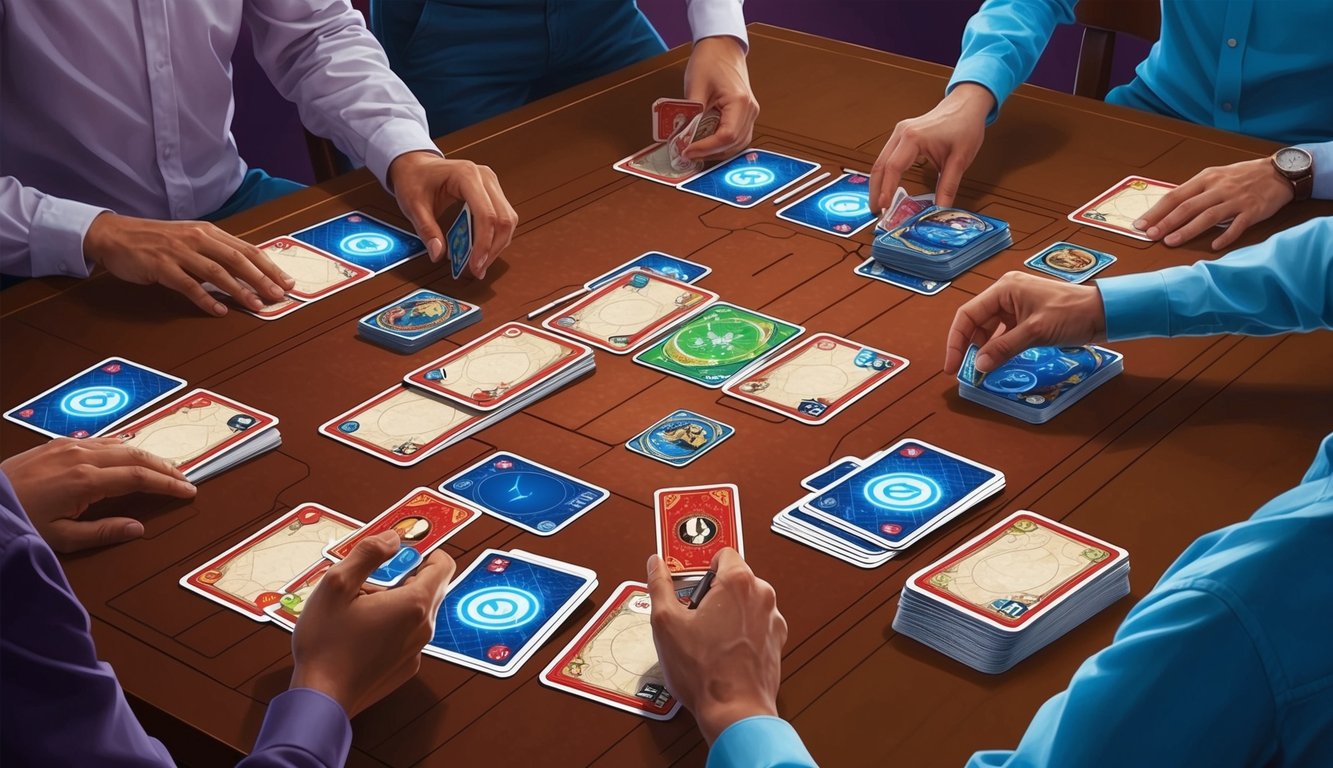
Deck-building games blend strategy with card management.
You’ll need to balance acquiring powerful cards, creating synergies, and maximizing victory points to come out on top.
Understanding Victory Points
Victory points are your ticket to winning.
In most deck-builders, you’ll earn these by purchasing specific cards or completing objectives.
Keep an eye on high-value cards that offer big point bonuses at the end of the game.
Some games let you convert resources into victory points.
Others reward you for building the most efficient engine.
You’ll want to tailor your strategy based on how points are scored in each game.
Don’t neglect defense! Blocking your opponents from scoring can be just as crucial as racking up points yourself.
Mastering Card Combos and Deck Management
Creating powerful card combinations is key to dominating deck-building games.
Look for cards that boost each other’s effects or trigger chain reactions.
Thin your deck by removing weaker starting cards when possible.
This increases the chances of drawing your best cards more frequently.
Balance is crucial.
Don’t overload on expensive cards that might clog up your hand.
Mix in some lower-cost options to keep your deck flowing smoothly.
Pay attention to card types.
Some games reward you for focusing on specific categories or factions.
Others benefit from a diverse approach.
Unique Themes and Settings

Deck-building games transport you to fascinating worlds and historical periods.
You’ll find yourself immersed in sci-fi epics and intense wartime conflicts through innovative card mechanics and thematic artwork.
Exploring New Worlds with Dune: Imperium
Dune: Imperium plunges you into Frank Herbert’s iconic sci-fi universe.
You’ll navigate the treacherous politics of Arrakis as you build your deck.
Each card represents characters, locations, and events from the Dune saga.
You’ll recruit allies, gather spice, and vie for control of the desert planet.
The game cleverly blends worker placement with deck-building, giving you tough choices each turn.
Do you deploy agents to key locations or play powerful card combos?
The artwork captures the essence of Dune, from the towering sandworms to the opulent imperial court.
You’ll feel like you’re pulling strings in a galactic power struggle with every card you play.
Historical Conflicts in Undaunted Series
Undaunted: Normandy and Undaunted: North Africa drop you into the heat of World War II battles.
These games recreate small-unit combat through clever deck-building mechanics.
You’ll lead a squad of soldiers, each represented by cards in your deck.
As casualties mount, cards are removed, simulating the attrition of war.
You’ll need to balance aggression with caution to achieve your objectives.
The games offer distinct experiences.
Normandy focuses on the D-Day invasion, while North Africa covers desert warfare.
You’ll adapt your tactics to each theater, whether it’s storming beaches or maneuvering tanks across dunes.
The Undaunted series stands out for its historical accuracy and engaging gameplay.
You’ll gain a new appreciation for the challenges faced by WWII soldiers through these captivating deck-builders.
Game Variants and Innovations
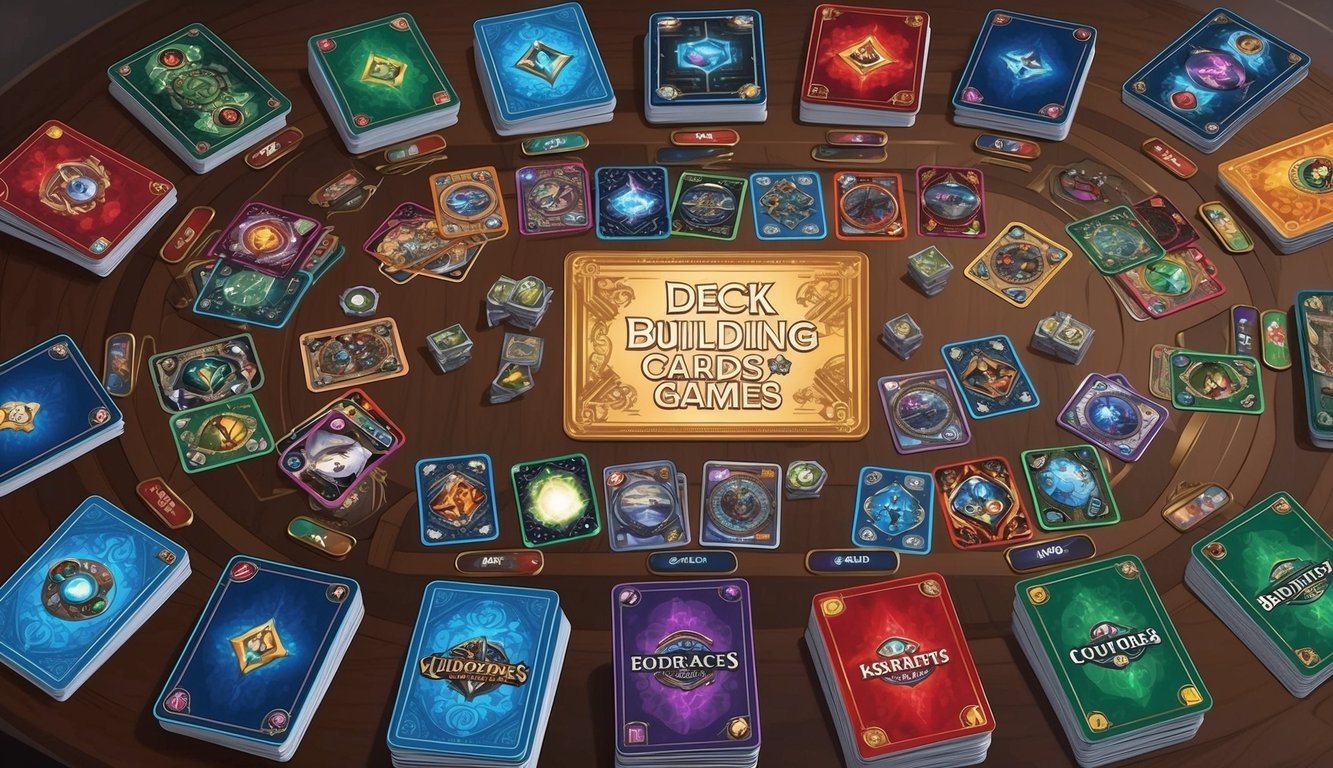
Deck-building games have evolved with exciting twists on the classic formula.
New mechanics keep the genre fresh and engaging for players looking for unique challenges.
The Push-Your-Luck Element
Push-your-luck adds a thrilling edge to deck-building.
You’ll face tough choices about how far to stretch your luck for bigger rewards.
Some games let you draw extra cards, but you risk losing your turn if you draw too many.
Others might have you fight increasingly powerful monsters for better loot.
But watch out – if you bite off more than you can chew, you could lose everything!
This element ramps up the excitement and creates memorable moments.
You’ll feel the tension as you decide whether to play it safe or go for broke.
Worker Placement Integration
Worker placement brings a whole new dimension to deck-building.
You’ll use your cards to place workers on different spots on the board.
This opens up fresh strategies and decision-making.
Great Western Trail is a prime example.
You’ll build your deck as you move your cowboy meeple along the trail.
Each stop presents different options for using your cards and workers.
Tyrants of the Underdark combines area control with deck-building and worker placement.
You’ll use your cards to deploy troops and spies across the map.
It’s a clever mix that adds depth to the gameplay.
These hybrids create a richer, more tactical experience.
You’re not just managing your deck, but also positioning your pieces for maximum effect.
Building Your Collection
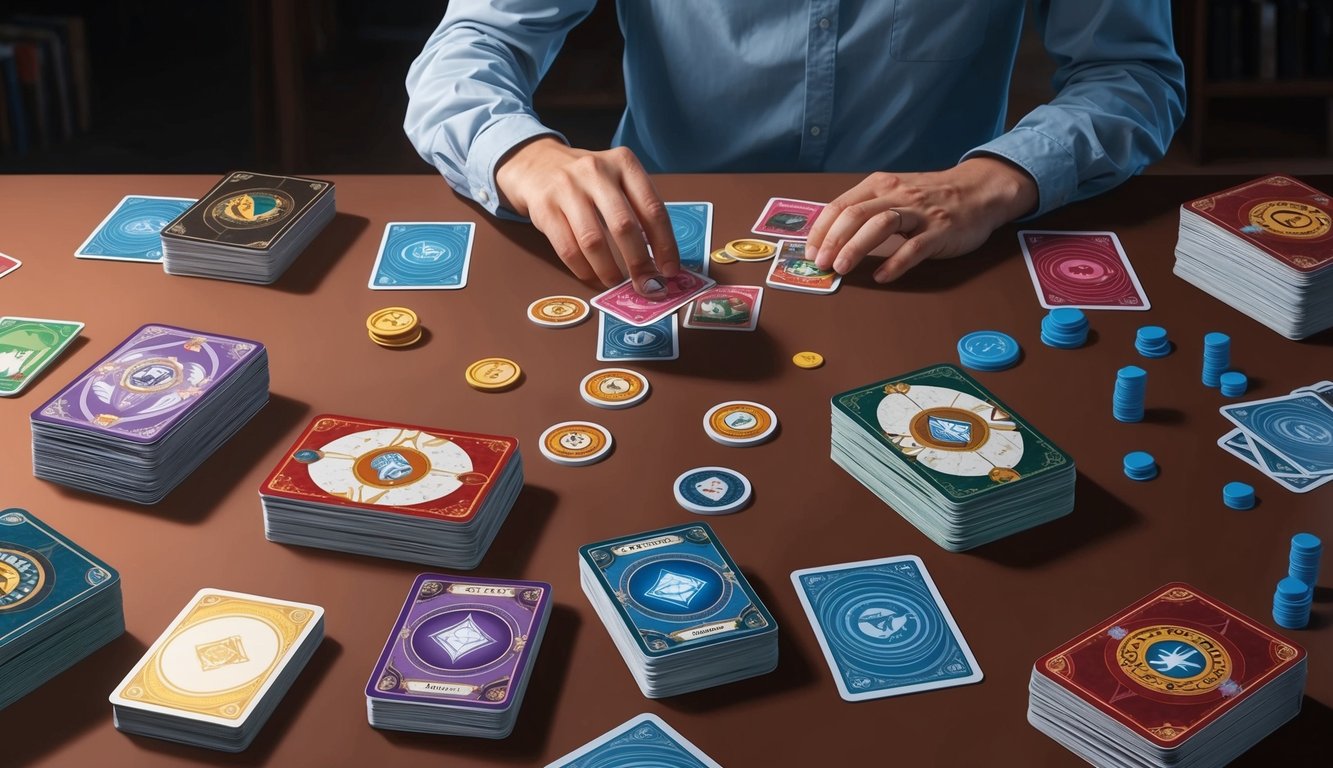
Starting a deck-building card game collection can be exciting and rewarding.
You’ll want to choose games that suit your interests and offer great replay value.
Choosing the Best Deck-Building Games
Look for popular titles like Slay the Spire, Dominion, and Star Realms.
These games have stood the test of time and offer unique gameplay experiences.
Read reviews and watch gameplay videos to get a feel for each game’s mechanics and theme.
Consider digital versions too.
Games like Hearthstone blend deck-building with online play, giving you endless opponents to challenge.
Don’t overlook lesser-known gems.
The Tea Dragon Society Card Game, for example, offers adorable artwork and a fresh take on deck-building.
Balancing Cost and Replayability
Budget wisely when building your collection.
Some games offer great value with just the base set, while others shine with expansions.
Focus on games with randomized market cards or multiple strategies.
These features boost replayability without needing extra purchases.
Look for games that let you combine sets.
This can give you more bang for your buck and keep gameplay fresh.
Consider the long-term costs.
CCGs like Magic: The Gathering can be pricey to keep up with, while standalone deck-builders often have a fixed cost.
Digital games can be more wallet-friendly, offering free-to-play options or one-time purchases with frequent updates.
Community and Competitive Play

Deck-building card games offer exciting opportunities to connect with other players and test your skills.
You’ll find vibrant communities both online and in-person, as well as competitive events to showcase your strategies.
Tournaments and Social Gatherings
Local game stores often host deck-building game nights and tournaments.
You can join these events to meet fellow enthusiasts and compete for prizes.
Some popular games like Dominion and Star Realms have official tournament circuits with regional and national championships.
Conventions are another great place to immerse yourself in the deck-building scene.
Gen Con and Origins Game Fair feature tournaments, demos, and social play areas for various tabletop games, including deck-builders.
Many players organize casual meetups through platforms like Meetup or Facebook Groups.
These gatherings are perfect for trying out new games, swapping strategies, and making friends who share your passion.
Online Communities and Resources
Deck-building game fans can find a treasure trove of resources on the internet.
BoardGameGeek hosts active forums.
There, you can discuss strategies, find player-created content, and read reviews for your favorite games.
Reddit communities like r/deckbuildinggames are great for sharing experiences.
They are also good for asking questions and staying up-to-date on new releases.
You’ll often find helpful tips from experienced players.
Many deck-building games have digital versions.
These versions allow you to play online against opponents worldwide.
Platforms like Steam and mobile app stores offer multiplayer options for popular titles.
YouTube channels and Twitch streams dedicated to deck-building games provide entertaining and educational content.
You can watch gameplay videos, strategy guides, and live tournaments to improve your skills and stay connected to the community.

